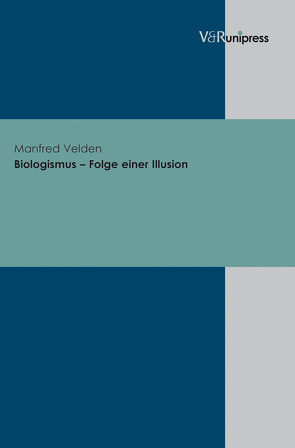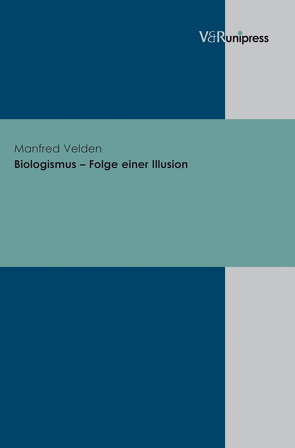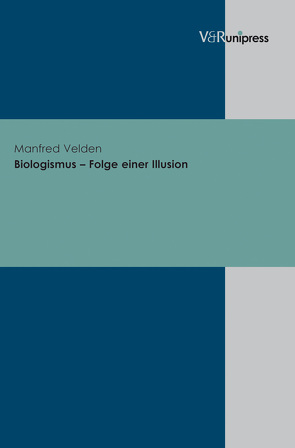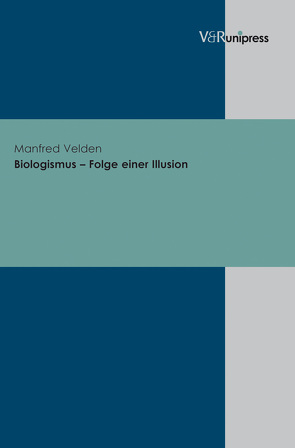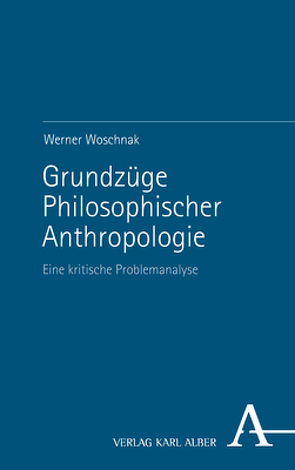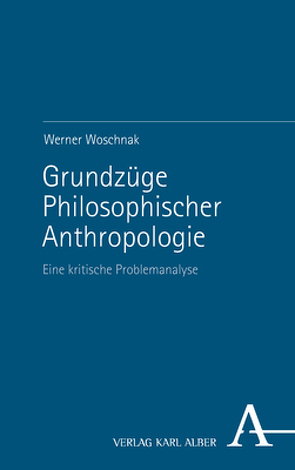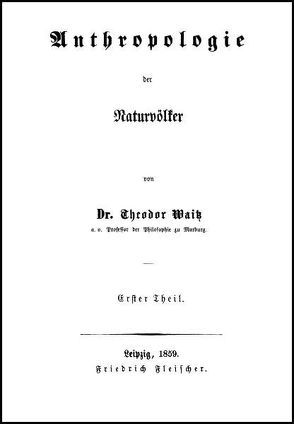
Die Absicht, die der Marburger Philosoph, Psychologe und Pädagoge Theodor Waitz (1821-1864) mit seinem großen Spätwerk (1859-72) verfolgte, war auf¬klärerisch und galt der Bekämpfung verbreiteter Vorurteile, insbesondere bio¬logistischer und rassistischer Art. Das macht die Aktualität der sechs Bände aus, die Waitz selbst nicht mehr fertigstellen konnte, sondern von seinem Freund und Schüler, dem Geographen Georg Gerland (1833-1919) zu Ende geführt wurden. Es handelt sich um die erste wirklich quellenkritische Zusammenstellung des ethnographischen Wissens um die Mitte des 19. Jahrhunderts, mit einer Fülle von Detailbeobachtungen, die infolge des oft erst danach einsetzenden rapiden Kulturwandels durch Kolonialismus, Mission und Weltwirtschaft auch heute noch eine unschätzbare Fundgrube darstellen. Waitz begriff seine Anthropologie als Zusammenführung von Natur- und Geisteswissenschaften, die ein gemein¬sames Ziel der Gesamtmenschheit im Auge hatte.
The intention of the Marburg philosopher, psychologist and pedagogue Theodor Waitz (1821-1864) in his last great work (1859-72) was to educate and to fight against widespread prejudice, especially biological and racial prejudice. This gives a contemporary relevance to the six volumes which Waitz was unable to finish himself, but which were completed by his friend and pupil the geographer Georg Gerland. This was the first synthesis of ethnographical knowledge in the mid-19th century based on a truly critical analysis of the sources, containing a wealth of detailed observation which, due to the rapid cultural changes which occurred soon after as a result of colonialism, missionary activity and the world economy, remains an invaluable source-book today. Waitz understood his anthropology as synthesis of the sciences and humanities with a common goal for all humanity.
Aktualisiert: 2023-06-30
> findR *
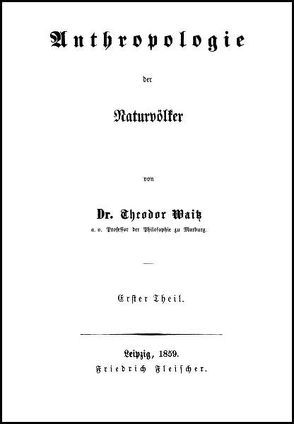
Die Absicht, die der Marburger Philosoph, Psychologe und Pädagoge Theodor Waitz (1821-1864) mit seinem großen Spätwerk (1859-72) verfolgte, war auf¬klärerisch und galt der Bekämpfung verbreiteter Vorurteile, insbesondere bio¬logistischer und rassistischer Art. Das macht die Aktualität der sechs Bände aus, die Waitz selbst nicht mehr fertigstellen konnte, sondern von seinem Freund und Schüler, dem Geographen Georg Gerland (1833-1919) zu Ende geführt wurden. Es handelt sich um die erste wirklich quellenkritische Zusammenstellung des ethnographischen Wissens um die Mitte des 19. Jahrhunderts, mit einer Fülle von Detailbeobachtungen, die infolge des oft erst danach einsetzenden rapiden Kulturwandels durch Kolonialismus, Mission und Weltwirtschaft auch heute noch eine unschätzbare Fundgrube darstellen. Waitz begriff seine Anthropologie als Zusammenführung von Natur- und Geisteswissenschaften, die ein gemein¬sames Ziel der Gesamtmenschheit im Auge hatte.
The intention of the Marburg philosopher, psychologist and pedagogue Theodor Waitz (1821-1864) in his last great work (1859-72) was to educate and to fight against widespread prejudice, especially biological and racial prejudice. This gives a contemporary relevance to the six volumes which Waitz was unable to finish himself, but which were completed by his friend and pupil the geographer Georg Gerland. This was the first synthesis of ethnographical knowledge in the mid-19th century based on a truly critical analysis of the sources, containing a wealth of detailed observation which, due to the rapid cultural changes which occurred soon after as a result of colonialism, missionary activity and the world economy, remains an invaluable source-book today. Waitz understood his anthropology as synthesis of the sciences and humanities with a common goal for all humanity.
Aktualisiert: 2023-06-30
> findR *
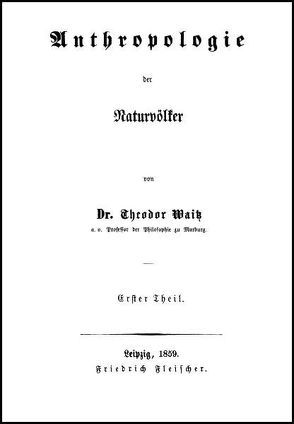
Die Absicht, die der Marburger Philosoph, Psychologe und Pädagoge Theodor Waitz (1821-1864) mit seinem großen Spätwerk (1859-72) verfolgte, war auf¬klärerisch und galt der Bekämpfung verbreiteter Vorurteile, insbesondere bio¬logistischer und rassistischer Art. Das macht die Aktualität der sechs Bände aus, die Waitz selbst nicht mehr fertigstellen konnte, sondern von seinem Freund und Schüler, dem Geographen Georg Gerland (1833-1919) zu Ende geführt wurden. Es handelt sich um die erste wirklich quellenkritische Zusammenstellung des ethnographischen Wissens um die Mitte des 19. Jahrhunderts, mit einer Fülle von Detailbeobachtungen, die infolge des oft erst danach einsetzenden rapiden Kulturwandels durch Kolonialismus, Mission und Weltwirtschaft auch heute noch eine unschätzbare Fundgrube darstellen. Waitz begriff seine Anthropologie als Zusammenführung von Natur- und Geisteswissenschaften, die ein gemein¬sames Ziel der Gesamtmenschheit im Auge hatte.
The intention of the Marburg philosopher, psychologist and pedagogue Theodor Waitz (1821-1864) in his last great work (1859-72) was to educate and to fight against widespread prejudice, especially biological and racial prejudice. This gives a contemporary relevance to the six volumes which Waitz was unable to finish himself, but which were completed by his friend and pupil the geographer Georg Gerland. This was the first synthesis of ethnographical knowledge in the mid-19th century based on a truly critical analysis of the sources, containing a wealth of detailed observation which, due to the rapid cultural changes which occurred soon after as a result of colonialism, missionary activity and the world economy, remains an invaluable source-book today. Waitz understood his anthropology as synthesis of the sciences and humanities with a common goal for all humanity.
Aktualisiert: 2023-06-30
> findR *
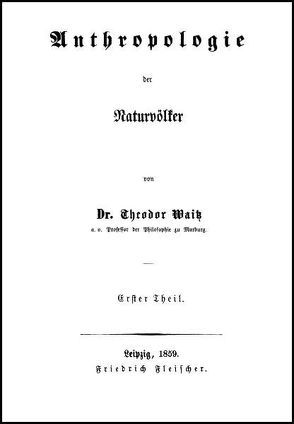
Die Absicht, die der Marburger Philosoph, Psychologe und Pädagoge Theodor Waitz (1821-1864) mit seinem großen Spätwerk (1859-72) verfolgte, war auf¬klärerisch und galt der Bekämpfung verbreiteter Vorurteile, insbesondere bio¬logistischer und rassistischer Art. Das macht die Aktualität der sechs Bände aus, die Waitz selbst nicht mehr fertigstellen konnte, sondern von seinem Freund und Schüler, dem Geographen Georg Gerland (1833-1919) zu Ende geführt wurden. Es handelt sich um die erste wirklich quellenkritische Zusammenstellung des ethnographischen Wissens um die Mitte des 19. Jahrhunderts, mit einer Fülle von Detailbeobachtungen, die infolge des oft erst danach einsetzenden rapiden Kulturwandels durch Kolonialismus, Mission und Weltwirtschaft auch heute noch eine unschätzbare Fundgrube darstellen. Waitz begriff seine Anthropologie als Zusammenführung von Natur- und Geisteswissenschaften, die ein gemein¬sames Ziel der Gesamtmenschheit im Auge hatte.
The intention of the Marburg philosopher, psychologist and pedagogue Theodor Waitz (1821-1864) in his last great work (1859-72) was to educate and to fight against widespread prejudice, especially biological and racial prejudice. This gives a contemporary relevance to the six volumes which Waitz was unable to finish himself, but which were completed by his friend and pupil the geographer Georg Gerland. This was the first synthesis of ethnographical knowledge in the mid-19th century based on a truly critical analysis of the sources, containing a wealth of detailed observation which, due to the rapid cultural changes which occurred soon after as a result of colonialism, missionary activity and the world economy, remains an invaluable source-book today. Waitz understood his anthropology as synthesis of the sciences and humanities with a common goal for all humanity.
Aktualisiert: 2023-06-29
> findR *
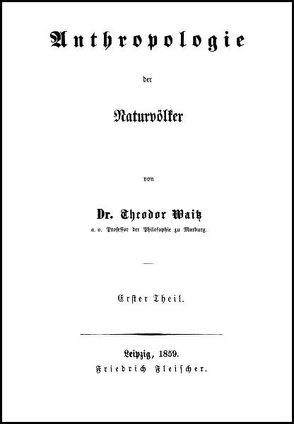
Die Absicht, die der Marburger Philosoph, Psychologe und Pädagoge Theodor Waitz (1821-1864) mit seinem großen Spätwerk (1859-72) verfolgte, war auf¬klärerisch und galt der Bekämpfung verbreiteter Vorurteile, insbesondere bio¬logistischer und rassistischer Art. Das macht die Aktualität der sechs Bände aus, die Waitz selbst nicht mehr fertigstellen konnte, sondern von seinem Freund und Schüler, dem Geographen Georg Gerland (1833-1919) zu Ende geführt wurden. Es handelt sich um die erste wirklich quellenkritische Zusammenstellung des ethnographischen Wissens um die Mitte des 19. Jahrhunderts, mit einer Fülle von Detailbeobachtungen, die infolge des oft erst danach einsetzenden rapiden Kulturwandels durch Kolonialismus, Mission und Weltwirtschaft auch heute noch eine unschätzbare Fundgrube darstellen. Waitz begriff seine Anthropologie als Zusammenführung von Natur- und Geisteswissenschaften, die ein gemein¬sames Ziel der Gesamtmenschheit im Auge hatte.
The intention of the Marburg philosopher, psychologist and pedagogue Theodor Waitz (1821-1864) in his last great work (1859-72) was to educate and to fight against widespread prejudice, especially biological and racial prejudice. This gives a contemporary relevance to the six volumes which Waitz was unable to finish himself, but which were completed by his friend and pupil the geographer Georg Gerland. This was the first synthesis of ethnographical knowledge in the mid-19th century based on a truly critical analysis of the sources, containing a wealth of detailed observation which, due to the rapid cultural changes which occurred soon after as a result of colonialism, missionary activity and the world economy, remains an invaluable source-book today. Waitz understood his anthropology as synthesis of the sciences and humanities with a common goal for all humanity.
Aktualisiert: 2023-06-29
> findR *
Biologism – the idea that the science of biology supplies the means to exhaustively explain psychological processes – has become vastly popular in recent decades. It can be shown that the idea is illusory on fundamental and a-priori grounds. Several fields of inquiry are described, where the biologistic project has demonstrably failed, like, for example, heritability estimates for mental traits (like intelligence). It is argued as well that biologism is just a further instance of an older, more comprehensive and equally illusory concept: psychology as a natural science (a science that produces generally accepted basic facts, for example the creation of a psychological risk factor for coronary disease). It is shown that psychology, masquerading as a natural science, as it largely does, may create serious societal problems like, for example, its misuse for racist purposes. The peculiar use of methodology in psychology is also documented.
Aktualisiert: 2023-06-28
> findR *
Biologism – the idea that the science of biology supplies the means to exhaustively explain psychological processes – has become vastly popular in recent decades. It can be shown that the idea is illusory on fundamental and a-priori grounds. Several fields of inquiry are described, where the biologistic project has demonstrably failed, like, for example, heritability estimates for mental traits (like intelligence). It is argued as well that biologism is just a further instance of an older, more comprehensive and equally illusory concept: psychology as a natural science (a science that produces generally accepted basic facts, for example the creation of a psychological risk factor for coronary disease). It is shown that psychology, masquerading as a natural science, as it largely does, may create serious societal problems like, for example, its misuse for racist purposes. The peculiar use of methodology in psychology is also documented.
Aktualisiert: 2023-06-28
> findR *
Biologism – the idea that the science of biology supplies the means to exhaustively explain psychological processes – has become vastly popular in recent decades. It can be shown that the idea is illusory on fundamental and a-priori grounds. Several fields of inquiry are described, where the biologistic project has demonstrably failed, like, for example, heritability estimates for mental traits (like intelligence). It is argued as well that biologism is just a further instance of an older, more comprehensive and equally illusory concept: psychology as a natural science (a science that produces generally accepted basic facts, for example the creation of a psychological risk factor for coronary disease). It is shown that psychology, masquerading as a natural science, as it largely does, may create serious societal problems like, for example, its misuse for racist purposes. The peculiar use of methodology in psychology is also documented.
Aktualisiert: 2023-06-28
> findR *
Nach welchen Kriterien lässt sich eine „britische Rasse“ konstruieren? Die „Eugenics Education Society“ beantwortete diese Frage in der „Eugenics Review“ mal mit biologischen, kulturellen und sozio-ökonomischen Ansätzen. Doch gab es trotz dieser bunten Mischung ein dominierendes „Rasseverständnis“ in der weltweit ersten Eugenikorganisation?
Aktualisiert: 2023-06-19
> findR *
Aktualisiert: 2023-06-15
> findR *
Aktualisiert: 2023-06-15
> findR *
Aktualisiert: 2023-06-07
> findR *
Aktualisiert: 2023-06-07
> findR *
Die britische "Eugenics Education Society" forderte im frühen 20. Jahrhundert Maßnahmen zum Schutz der "britischen Rasse". Doch nach welchen Kriterien ließ sich diese definieren und welche Bevölkerungsgruppen sollten dazugehören? Auf diese Fragen hatte die weltweit erste Organisation der internationalen Eugenikbewegung mehr als eine Antwort parat. In der von der EES ab 1909 herausgegebenen Zeitschrift "The Eugenics Review" kamen je nach Autor_in unterschiedliche Vorstellungen davon zum Tragen, was eine "Rasse" ausmachte. Dabei reichten die Ansätze von biologischen bis hin zu sozio-ökonomischen und kulturellen Kriterien, ohne dass eine einheitliche Linie offenkundig wurde. In dieser Arbeit werden die unterschiedlichen Darstellungen und Beschreibungen untersucht, um herauszufinden, ob sich trotz der heterogenen Ansätze ein grundlegendes "Rasseverständnis" erkennen lässt.
Aktualisiert: 2023-06-02
> findR *
Aktualisiert: 2023-06-01
> findR *
Aktualisiert: 2023-06-01
> findR *
Aktualisiert: 2023-06-01
> findR *
Biologism – the idea that the science of biology supplies the means to exhaustively explain psychological processes – has become vastly popular in recent decades. It can be shown that the idea is illusory on fundamental and a-priori grounds. Several fields of inquiry are described, where the biologistic project has demonstrably failed, like, for example, heritability estimates for mental traits (like intelligence). It is argued as well that biologism is just a further instance of an older, more comprehensive and equally illusory concept: psychology as a natural science (a science that produces generally accepted basic facts, for example the creation of a psychological risk factor for coronary disease). It is shown that psychology, masquerading as a natural science, as it largely does, may create serious societal problems like, for example, its misuse for racist purposes. The peculiar use of methodology in psychology is also documented.
Aktualisiert: 2023-05-28
> findR *
Nach Kant ist der Mensch dort, wo es um die Verwirklichung von Humanität geht, auf Wissen angewiesen. Welche Wissenschaft aber verbürgt ihm die Einsicht in das, was es heißt, ein Mensch zu sein? – Philosophie? Anthropologie? Philosophische Anthropologie? Die problemorientierte Entfaltung der Frage: „Was ist der Mensch?“ setzt sich im Anschluß an Einsichten klassischer Philosophie mit den anthropologischen Konzepten von Scheler, Plessner, Portmann und Gehlen auseinander. Im Fokus der Kritik steht dabei jener Biologismus, der für das Scheitern des Versuches, das Wesen des Menschen in vergleichender Abhebung von der Daseinsform des Tieres zu klären symptomatisch ist. Im Rückbezug auf Herder, der den Menschen als Sprachwesen begreift, wird in ersten Schritten der Weg zu einer Überwindung des Programms neuzeitlicher Anthropologie durch eine „Philosophie von der Sprache her“ (Bruno Liebrucks) skizziert.
Aktualisiert: 2023-05-17
> findR *
Nach Kant ist der Mensch dort, wo es um die Verwirklichung von Humanität geht, auf Wissen angewiesen. Welche Wissenschaft aber verbürgt ihm die Einsicht in das, was es heißt, ein Mensch zu sein? – Philosophie? Anthropologie? Philosophische Anthropologie? Die problemorientierte Entfaltung der Frage: „Was ist der Mensch?“ setzt sich im Anschluß an Einsichten klassischer Philosophie mit den anthropologischen Konzepten von Scheler, Plessner, Portmann und Gehlen auseinander. Im Fokus der Kritik steht dabei jener Biologismus, der für das Scheitern des Versuches, das Wesen des Menschen in vergleichender Abhebung von der Daseinsform des Tieres zu klären symptomatisch ist. Im Rückbezug auf Herder, der den Menschen als Sprachwesen begreift, wird in ersten Schritten der Weg zu einer Überwindung des Programms neuzeitlicher Anthropologie durch eine „Philosophie von der Sprache her“ (Bruno Liebrucks) skizziert.
Aktualisiert: 2023-05-16
> findR *
MEHR ANZEIGEN
Bücher zum Thema Biologismus
Sie suchen ein Buch über Biologismus? Bei Buch findr finden Sie eine große Auswahl Bücher zum
Thema Biologismus. Entdecken Sie neue Bücher oder Klassiker für Sie selbst oder zum Verschenken. Buch findr
hat zahlreiche Bücher zum Thema Biologismus im Sortiment. Nehmen Sie sich Zeit zum Stöbern und finden Sie das
passende Buch für Ihr Lesevergnügen. Stöbern Sie durch unser Angebot und finden Sie aus unserer großen Auswahl das
Buch, das Ihnen zusagt. Bei Buch findr finden Sie Romane, Ratgeber, wissenschaftliche und populärwissenschaftliche
Bücher uvm. Bestellen Sie Ihr Buch zum Thema Biologismus einfach online und lassen Sie es sich bequem nach
Hause schicken. Wir wünschen Ihnen schöne und entspannte Lesemomente mit Ihrem Buch.
Biologismus - Große Auswahl Bücher bei Buch findr
Bei uns finden Sie Bücher beliebter Autoren, Neuerscheinungen, Bestseller genauso wie alte Schätze. Bücher zum
Thema Biologismus, die Ihre Fantasie anregen und Bücher, die Sie weiterbilden und Ihnen wissenschaftliche
Fakten vermitteln. Ganz nach Ihrem Geschmack ist das passende Buch für Sie dabei. Finden Sie eine große Auswahl
Bücher verschiedenster Genres, Verlage, Autoren bei Buchfindr:
Sie haben viele Möglichkeiten bei Buch findr die passenden Bücher für Ihr Lesevergnügen zu entdecken. Nutzen Sie
unsere Suchfunktionen, um zu stöbern und für Sie interessante Bücher in den unterschiedlichen Genres und Kategorien
zu finden. Unter Biologismus und weitere Themen und Kategorien finden Sie schnell und einfach eine Auflistung
thematisch passender Bücher. Probieren Sie es aus, legen Sie jetzt los! Ihrem Lesevergnügen steht nichts im Wege.
Nutzen Sie die Vorteile Ihre Bücher online zu kaufen und bekommen Sie die bestellten Bücher schnell und bequem
zugestellt. Nehmen Sie sich die Zeit, online die Bücher Ihrer Wahl anzulesen, Buchempfehlungen und Rezensionen zu
studieren, Informationen zu Autoren zu lesen. Viel Spaß beim Lesen wünscht Ihnen das Team von Buchfindr.





